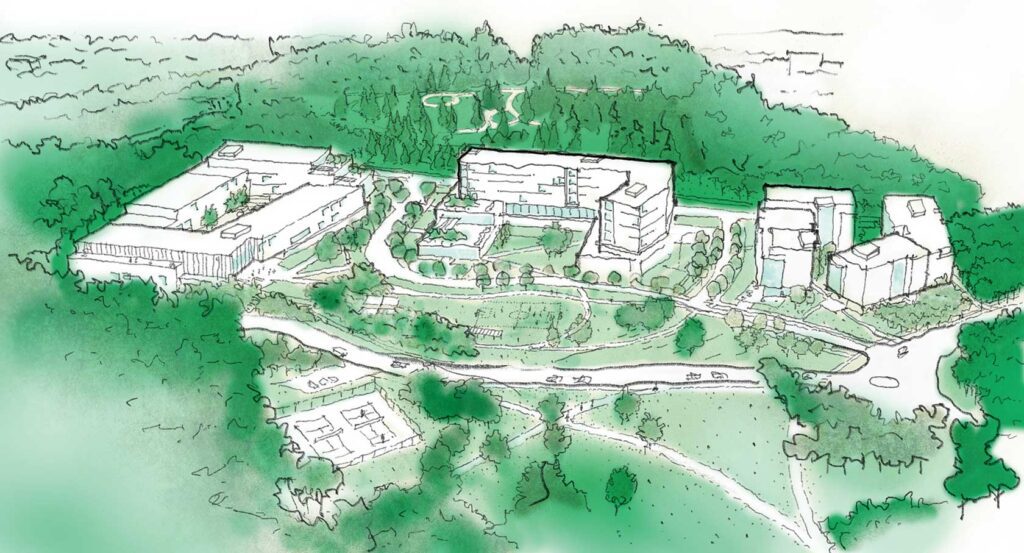Growing coalition voices opposition to Shattuck plan
Neighbors say city unable to manage current drug use in park

Five years ago, when state officials were developing a request for proposals for the redevelopment of the Shattuck Hospital site in Franklin Park, Louis Elisa was a lone voice speaking in opposition of the plans, which evolved into a call for 75 to 100 shelter units for people experiencing homelessness and addiction.
Now that a group of nonprofits, including Boston Medical Center, Bay Cove Human Services, Pine Street Inn and the Jamaica Plain Neighborhood Development Corporation, is calling for an 800-unit campus with outpatient programs to serve at least 400 people per day, opposition to their proposal has expanded.
Activists say the coalition of groups opposed to the Shattuck proposal now includes 30 community groups representing the neighborhoods around the park including the Coalition for Region-Wide Services Beyond Franklin Park, which organizers say has more than 400 members.
“In the last month or so, I’ve seen people from Mattapan, Dorchester and Jamaica Plain asking, how could this possibly work?” Elisa said.
State officials and representatives of the nonprofits advancing the Shattuck plan faced pointed questions from the coalition members as they sought support for the proposed 800-unit development during an Oct. 23 meeting in the auditorium of Brooke High School on American Legion Highway.
Asked about particulars of their plans — How would they manage the crimes and nuisances stemming from outpatient drug treatment programs? Is it effective to concentrate so many people suffering addiction in one place? Has the state considered siting housing and addiction services on any other publicly-owned parcels? — proponents provided few answers.
Abi Vladeck, director of public/private development for the state’s Division of Capital Asset Management and Maintenance, was asked how a request for proposals calling for 75-100 units of supportive housing for people experiencing homelessness and addiction morphed into an 800-unit proposal. Vladeck noted that the proposal now under consideration was the sole response to the RFP.
“We thought in totality that provisionally designating the (nonprofit partners) was the right plan,” she said.
Built in Franklin Park in 1954, the Lemuel Shattuck Hospital has served patients in state custody for decades. While the building is still being used as a hospital, the site currently offers emergency shelter beds for up to 120 homeless people and has 12 stand-alone shelters that were erected on a parking lot there.
The proposal being advanced now would include 450 beds for people in treatment for addiction and 405 housing units available to people who are experiencing addiction, whether or not they’re in recovery. In addition, the plan calls for an expansion of outpatient services for people experiencing addiction, including distribution of methadone and suboxone and distribution of kits that allow people to inject heroin safely.
With the services at their current level, evidence of drug use is rampant in sections of the park near the Shattuck, including discarded needles, rubber strips from the injection kits and packets of saline solution in which heroin can be diluted for injection. Residents of the neighborhoods around the park say the city has not been able to manage the drug use in the park as it currently stands.
The coalition of community-based organizations opposing the Shattuck plan includes people opposed to the siting of any units in the park as well as some who want to see fewer units in the development plan.
“We all believe Boston Medical Center’s proposal is too large and it goes against conventional wisdom of how you should do treatment,” said Jamaica Plain resident Rory Coffey. “We should really be putting services in the communities where people currently are.”
The push to develop an addiction and recovery community in Franklin Park comes at the same time that city officials have been pushing to crack down on the masses of homeless people camping out in the Massachusetts Avenue/Melnea Cass Boulevard area. Although Mayor Michelle Wu made a campaign promise to decentralize the addiction services that are provided in the Mass and Cass area and distribute them throughout the city, city officials have yet to propose siting any such programs outside of the Roxbury vicinity.
If built, the 800-unit development planned for the Shattuck site would be the largest concentration of treatment beds in the United States, according to both sides. Activists fear the development, along with its proposal for outpatient services for at least 400 people a day would lead to a shift in encampments, drug dealing and open-air drug use from the Mass and Cass area to the areas in and around Franklin Park.
“We’re not adverse to sobriety,” said Elisa, who heads the Roxbury-based Garrison Trotter Neighborhood Association. “We’re not adverse to treatment. We’re adverse to them dumping this all in our community.”
The plans for the Shattuck redevelopment come as city officials also are planning major changes to transportation and recreation in and around Franklin Park. Those plans include redesigning Blue Hill Avenue, closing the portion of Circuit Drive that cuts through Franklin Park, building an animal shelter in its maintenance area and renovating White Stadium and siting a women’s professional soccer team there with at least 20 home games during the season, which runs from late February through October.
“When you look at everything going on all at once, it’s a complete redesign of this community,” said Fatima Ali-Salaam, chair of the Greater Mattapan Neighborhood Council.







